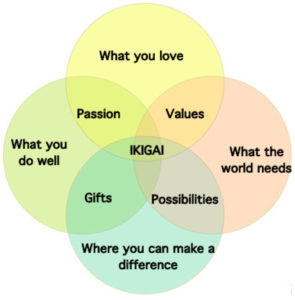Family-Business Ikigai
Over the holidays I was given a copy of Ikigai, The Japanese Secret to a Long and Happy Life, written by Héctor García and Francesc Miralles.
 Ikigai (生き甲斐) is a Japanese concept meaning “a reason for being.” The word, translated into English roughly means, the “source of value in one’s life;” the “thing that you live for” or “the reason for which you wake up in the morning.”[1] The literal meaning is contained in the Japanese characters. 生き, “life” and 甲斐, “to be worthy.”
Ikigai (生き甲斐) is a Japanese concept meaning “a reason for being.” The word, translated into English roughly means, the “source of value in one’s life;” the “thing that you live for” or “the reason for which you wake up in the morning.”[1] The literal meaning is contained in the Japanese characters. 生き, “life” and 甲斐, “to be worthy.”
As I read the book, my uncle Nick came to mind. I recognized then the importance of Ikigai to an individual in a family business like ours. Uncle Nick was a master carpenter, and through his craft he provided well for his family. He was also a mentor, a bearer of family values and the custodian of a strong work ethic; in nearly 40 years he rarely missed a day’s work. I recognize now how profoundly practicing his craft and providing for his family gave him his purpose, his reason for being. Sadly, he passed away within 2 years of retiring. We’ve felt his loss keenly. Looking back, I see that one reason for his untimely demise was that he no longer had a driving reason for continuing to live. Nor had he thought to try and find one.
To understand the basis for living a long life the authors of Ikigai studied communities around the world in which there was a population of individuals 100 years of age or more.
They found that these individuals had purpose and remained active—mentally, physically and spiritually. They found people who had Ikigai.
They found centenarians that were doing:
- What they loved
- What they did well
- What the world needed
- Work that could make a difference
The found individuals whose lives were about connecting, creating, serving, teaching, building, healing and nourishing others.
It’s widely known that living with purpose and meaning protects against stress and illness.
In western culture, retirement too often carries with it a sense of abandonment of purpose. This was the crisis my uncle experienced. In Ikigai, retirement is seen as a transition, if not an evolution. The process of discovering what to do next is built on a group of principles: passion, values, what the world needs, where you can make a difference and more. (See figure.)
Helping a leader, who has been at the helm of a family business for many years, discover a new purpose—that which comes next—is an important practice that successful multi-generational family businesses undertake. It’s a critical step for preserving the family’s tangible and intangible assets. Importantly it also fosters a significant sense of fulfillment for all family members, supporting successful transitions across generations.
